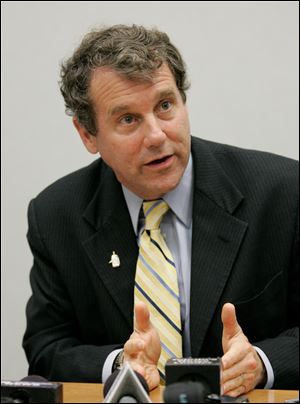
Curb to 'drug pipeline' sought
Brown's legislation targets use of multiple pharmacies, doctors
5/5/2011
U.S. Sen. Sherrod Brown says drug abusers and drug dealers use Medicaid cards to visit multiple doctors or pharmacies.
A federal law proposed by U.S. Sen. Sherrod Brown (D., Ohio) would require states to take a tougher stance in the fight against Medicaid fraud involving prescription drugs.
Mr. Brown said Wednesday he introduced a bill targeting "doctor-shopping and pharmacy-hopping" that allows drug abusers and drug dealers to obtain pain medications such as Oxycodone, either to use illegally or to sell.
Medicaid, the taxpayer-funded program for medical care for the poor, paid the bill for $820 million worth of prescription drugs in Ohio last year.
The legislation focuses on the fraudulent use of Medicaid cards to obtain and fill prescriptions for addictive pain medications.
"When criminals defraud the Medicaid system to fuel prescription abuse, it's a one-two punch to the stomach of Ohio taxpayers," Mr. Brown said.
Mr. Brown said drug abusers and drug dealers use their Medicaid cards to visit multiple doctors or pharmacies. Law enforcement officials have pointed to a rising tide of prescription drug abuse and accidental overdoses.
Mr. Brown said Ohio is second only to Florida in the number of Oxycodone prescriptions filled, at 927,000 doses in Ohio in the first six months of 2010.
Ohio's death rate because of unintentional drug poisoning increased more than 350 percent from 1999 to 2008, and became the leading cause of accidental death in Ohio in 2007.
Prescription pain medications such as Oxycodone, morphine, and methadone are largely responsible for the increasing numbers of overdoses and deaths, he said.
Mr. Brown said the problem is worst in rural counties, especial in southern Ohio.
The Stop Trafficking of Pills Act would require national adoption of Medicaid "lock-in" programs, which are used in nearly 20 states. A "lock-in" recipient is asked to choose one physician provider and one pharmacy provider.
Benjamin Johnson, spokesman for the Ohio Department of Job and Family Services, said Ohio has had a lock-in program since 1983 that has become outdated. He said the administration is redesigning it.
Mr. Brown said he wrote to Republican Gov. John Kasich's administration about establishing a Medicaid "lock-in" program.
And he said he has asked U.S. Attorney General Eric Holder to establish two "tactical diversion squads" in Ohio to help the state crack down on "pill mills" and prescription drug-related crimes.
The Ohio Highway Patrol has also begun focusing more on prescription pill couriers on interstate highways through Ohio. In March, the highway patrol joined with other agencies in a series of arrests that netted 1,376 illegal prescription pills, including Oxycodone, Vicodin, and Xanax.
Col. John Born, superintendent of the state highway patrol, told The Blade Wednesday that U.S. 23 is a known corridor of illegal drugs from the Detroit area to southern Ohio and into other states.
"We've impacted pills moving from Detroit, Mich., or near Detroit, to or through southern Ohio to the point that U.S. 23 was being referred to as the 'pill pipeline,' " Colonel Born said.
Colonel Born also said the epidemic in prescription drug abuse is fueling a rise in heroin use because abusers turn to heroin as a cheaper alternative.
In March, a Monroe County doctor was indicted for allegedly defrauding Medicare of more than $57 million through his pain clinic on LaPlaisance Road.
Dr. Oscar Linares was charged in a criminal complaint with unlawfully distributing prescription drug controlled substances and health-care fraud.
According to a complaint in U.S. District Court in Detroit, roughly 4,000 patients from Michigan, Ohio, and other states were prescribed more than 2 million painkillers from April 1, 2008, to March 24, 2010, at the clinic.